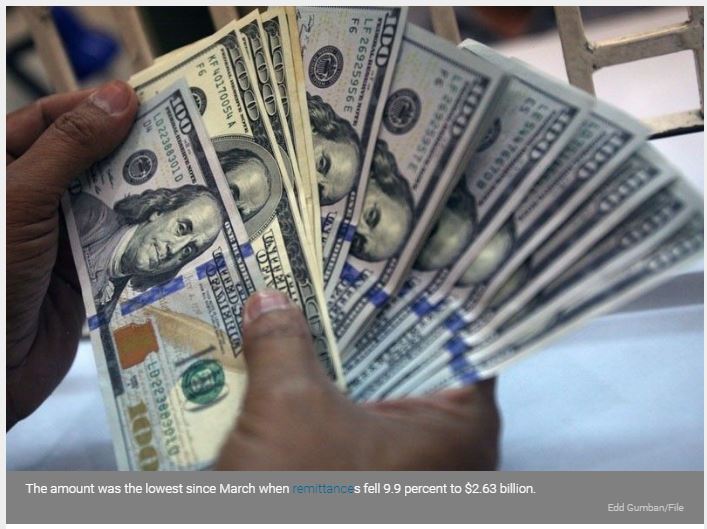Philippines: Remittances drop in June
MANILA, Philippines — Remittances from overseas Filipino workers contracted in June, tumbling to the lowest level in three months amid the decline in the deployment of Filipino workers due to the government’s repatriation program in the Middle East, the Bangko Sentral ng Pilipinas reported yesterday.
BSP Governor Nestor Espenilla Jr. said personal remittances consisting of cash and non-cash items that flow through both formal or via electronic wire and informal channels such as money or goods carried across borders declined by nearly five percent to $2.61 billion in June from $2.75 billion in the same month last year.
The amount was the lowest since March when remittances fell 9.9 percent to $2.63 billion.
Personal remittances climbed by 2.8 percent to $15.79 billion in the first half from $15.36 billion in the same period last year.
On the other hand, cash remittances coursed through banks declined by 4.5 percent to a three-month low of $2.36 billion in June from $2.47 billion in the same month last year due to the government’s repatriation program.
Espenilla said countries with the biggest declines in cash remittances were led by the United Arab Emirates, Saudi Arabia, and Kuwait as 4,149 Filipino workers were repatriated from January to February.
Data from the Philippine Overseas Employment Administration (POEA) showed the deployment of land-based Filipino workers declined 3.3 percent or 1.61 million last year, while that of sea-based workers fell 14.6 percent or 378,072.
Espenilla said cash remittances inched up by 2.7 percent to $14.18 billion in the first half from $13.81 billion in the same period last year.
The BSP chief said the US, Saudi Arabia, Singapore, United Kingdom, UAE, Japan, Qatar, Germany, Hong Kong, and Canada accounted for 79 percent of total remittances in the first half.
The BSP has set a four percent growth target for remittances this year.
Beneficiaries of remittances emerge as one of the winners of the continued weakening of the peso against the dollar. The local currency is one of the weakest performing currency in the region after breaching the 53 to $1 level to hit a fresh 12-year low this year.
Remittances continue to boost personal consumption, helping sustain a steady growth. Personal remittances accounted for 10 percent of gross domestic product (GDP) and 8.3 percent of gross national income last year.
The inflow also helps boost the country’s thinning gross international reserve (GIR) level that narrowed to a fresh six-year low $76.89 billion in July as the BSP continued to prevent the sharp depreciation of the peso by intervening in the foreign exchange market.
Source: https://www.philstar.com/business/2018/08/16/1842883/remittances-drop-june#xQqRRzp3EyTaE5lO.99


 Thailand
Thailand




